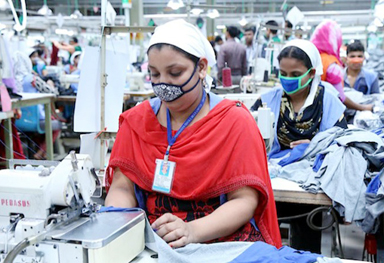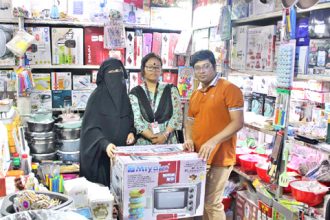DE Online Desk
In a recent report by the Fair Labor Association (FLA), they said buyers must commit to ensuring that costing and purchase orders accommodate the new minimum wage standards of TK12,500 and TK12,800 in Export Processing Zones (EPZs).
The study emphasises the importance of adjusting purchase orders to cover labour costs, effective from December 1, 2023 to enable Bangladesh’s suppliers to meet the updated wage requirements.
In its report titled “Wage Trends: Bangladesh,” the FLA also sheds light on the monthly average wages of Ready-Made Garment (RMG) workers in Bangladesh over the past four years.
Shockingly, the report reveals that over this period, there has been a meagre 0.95% increase in the monthly average net wage. In contrast, the inflation rate in Bangladesh soared by 9.02% in just the last year, leading to a 4.6% decline in the monthly average wage for workers.
Comparing these figures with the 2022 Global Living Wage Coalition (GLWC) estimate for Dhaka (TK23,254, or $211.90), the report highlights a significant living wage gap for Bangladeshi workers, amounting to TK12,040 ($109.70). This discrepancy underscores that the average monthly net wage in 2022 was 51.78% below the living wage benchmark.
Meanwhile, during a recent Meeting of Experts on wage policies held on March 13, the International Labour Organization (ILO) addressed living wage issues.
Experts unanimously agreed on the pivotal role of decent wages in fostering economic and social development, advancing social justice, and reducing poverty and inequality. They defined a living wage as the level necessary to afford a decent standard of living for workers and their families, tailored to the country’s circumstances and calculated based on normal working hours. FLA, an extensive network comprising companies, universities, and civil society organizations, advocates for human rights in workplaces worldwide, aiming to ensure fair pay and safeguard the health, safety, and well-being of millions of individuals employed in factories and farms.
Utilizing data gathered from member companies, FLA has conducted comprehensive analyses of wage structures in factories across Bangladesh using its Fair Compensation Dashboard. The findings of these analyses have led to recommendations for action.
The report suggests that buyers must actively engage with their suppliers in Bangladesh, ensuring that suppliers have the opportunity to provide feedback if purchase orders fail to account for increased labour costs. It emphasizes the importance of resolving any such issues through collaboration with purchasing departments and senior management, thereby fostering a more equitable and sustainable supply chain.
“Buyers and suppliers should support workers’ rights to freedom of association and collective bargaining and publicly denounce the use of violence against workers and human rights defenders,” the report also recommended.
In 2024, Fair Labor Accredited companies and suppliers should update supply chain wage data analysis and actions taken to implement their company’s fair compensation blueprint.
FLA companies and suppliers should develop sustainable plans with their suppliers and production facilities to improve purchasing and production practices that support the progress of workers’ wages to meet the GLWC estimates for Bangladesh, the report also suggested. Regarding the FLA report, BGMEA President Faruque Hassan said that all the member factories of the country have implemented the new minimum wages.
He, however, appreciated the report noting that the global platform made a good statement calling buyers to take responsibility to ensure living wages for the workers.
RMG buyers must commit to minimum wages

Leave a comment







